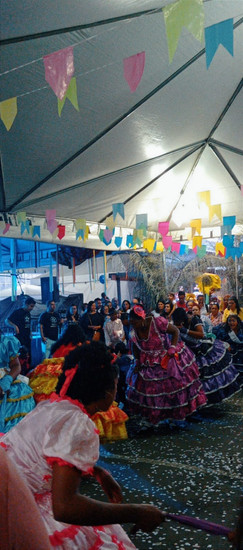A big network!
- María Luz Peña
- 19 dic 2023
- Tempo di lettura: 4 min
Giordana Drago

In my life I had heard many stories about the favela and Rio de Janeiro, starting with films like City of God, and so my idea and image was not the best. So, I tried to go out with as few expectations as possible, to avoid stereotypes and prejudices: my aim was mainly to help the children as much as possible, by playing with them, distracting them, telling them stories of optimism and other worlds outside the favela.
At first, I was worried that I wouldn't be able to do much: not being qualified and specialized in something, I sometimes feel that I haven't done anything concrete, but I always tried to do what I could.
At first, I was like a sponge: I absorbed everything I saw and heard, I was very curious because everything was new. What struck me about Rio is its size: everything is huge compared to Europe, from nature to the streets, the buildings, the houses, the suburbs.
My first memory was after leaving the airport, when I was passing Avenida Brasil. At night, the favela was illuminated by thousands of lights and was full of cars. As soon as I got home, Father Renato was there to welcome me, tell me and explain many things about the Casa do Menor, together with Lucinha.
Casa do Menor is a very big reality and it’s located in several countries. I was very impressed by the number of people involved, such as the workers, and the thousands who have been and still are helped. The number of people in need is impressive.
The relationship with the people there was very good: they were all very kind and helpful, they gave me lots of advice and told me lots of stories. At first it was perhaps difficult because they were all adults and very committed, so I often found myself alone, but with the arrival of the other volunteer everything was reversed.
I also arrived at a certain time for the CdM, when there were no other volunteers and Father Renato had returned to Italy, and I came across a certain disorganization that sometimes left me feeling a little out of place. At times I felt a bit alone, excluded, it's difficult to integrate and settle in at first, and there are also people who are more available and others who are less.
Above all, I felt lost in such a huge country on the other side of the world from Italy. Lost from an emotional point of view, the emotions were many and conflicting: what I sometimes felt, listening to the stories of those who live in the Baixada, was something very big that left me deeply disoriented.
Over time, however, as is always the case, things calmed down and relationships with educators, coordinators and colleagues improved: most of the time I found other people to be kind, cheerful and available, which facilitated the process of getting to know them and working with them.
The best moment for me was when I arrived at any project: every morning I was greeted at the various CdM offices by children with open arms who ran to meet me and couldn't wait to play. I felt like I was their sister, so much was the love they showed, they gave me more than I could ever give: I will never be grateful enough for everything I learned and saw, for the love I received.
Talking about the social reality of the places, I think there should be a book written about it. What I realized is that there isn't just one reality, but that there are many that coexist and contradict each other: the suburbs, the center of Rio, the thousands of people in this metropolis, some reduced to poverty, others with houses facing the sea, those who work honestly despite everything, those who get involved in drug trafficking, either as bandits or as children living in this context.
I often felt like a stranger, and this caused a change in me, especially mentally: it was my first time on my own outside of Europe and the Western world, but I saw that it also has many aspects that are similar to my Mediterranean culture, and others that are very different. In fact, I've often felt very Western, even just in appearance, and I realize that my mind is deeply influenced by my culture. Many stereotypes and ideas I had about Brazil have been debunked.
The biggest change was that, even when you feel powerless in the face of so much suffering, even a little care and attention can make a big difference. Sharing anything from joy, parties, food, pain, silence, mourning.
I left with no expectations, to be as judgment-free as possible. And even though I had some expectations, they were all met. When I was on the plane coming back, I was exhausted. Now that I'm home, I'm calmly trying to retrace what I've experienced, even if it takes a while.
So many wonderful memories that I hope to relive. A new awareness of the disparities and injustices, which are almost exaggerated in Rio, but which are not lacking even here in Italy. I can and will make my contribution here too.

I grew up a lot during this period, it’s not for everyone to travel alone to the other side of the world, especially as a woman, but I wanted to prove otherwise and I succeeded, thanks above all to all those who helped me.
It created a network, a chain effect, which I hope to be able to share with other people too!








